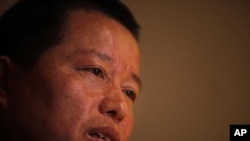U.N. human-rights experts are denouncing the continued secret detention of Gao Zhisheng, a prominent Chinese lawyer who was arrested in 2006. Experts are renewing their appeal for Gao's freedom on the day that Chinese writer Chen Wei was sentenced to nine years in jail by a Beijing court for allegedly inciting subversive writing.
The UN experts say they are concerned at recent news that a Beijing court has withdrawn Gao Zhisheng's five-year probation and ordered him to serve a three-year sentence. His probation was to end this week.
Gao's whereabouts have been unknown for the last 20 months. This is causing great concern in human-rights circles, including the U.N.'s top human rights official, Navi Pillay. Her spokesman, Rupert Colville, says the high commissioner is very disturbed by the court's decision to extend Gao's probation with a three-year prison sentence.
"For the past 20 months, Gao has been subject to strict monitoring measures by the Public Security Bureau in what appears to be a form of house arrest in an unknown location," said Colville. "The case is illustrative of a trend of secret detention and disappearances of human-rights defenders, which the high commissioner for human rights, Navi Pillay, and other U.N. human-rights bodies have already criticized on several occasions in recent years."
In 2005, Gao's license to practice law in China was revoked and his firm was shut down, allegedly for calling on the government to end abuse of religious groups. He was subsequently arrested in 2006 because of his work as an advocate for human rights in China, and accused of subversion of state power.
Colville says the U.N. high commissioner has raised the specific case of Gao, along with a number of others, with Chinese authorities twice in the past seven months. In response to a question, he tells VOA he does not see these appeals to the Chinese government as an exercise in futility.
He says every time the government responds to inquiries, the U.N. office receives a bit more information about Gao and about other cases of human-rights concern.
"So far as we are aware, in their responses - and the government has responded quite often to these queries - in their responses they never once mentioned that he was violating the probation rules," said Colville. "So, therefore, that is why it is even more mysterious as to why just as his probation ends, suddenly his full sentence is imposed on him. We are also planning to urgently seek information from the government on his health conditions because there are unconfirmed reports concerning that."
Colville says Gao's continued detention is taking place just as a troubling new amendment is being proposed to China's criminal law procedure. He says the amendment is likely to permit the legalization of secret detentions. He says this will represent a major setback for civil and political rights in China.
UN Experts Denounce China's Secret Detention of Human-Rights Lawyer
- By Lisa Schlein




